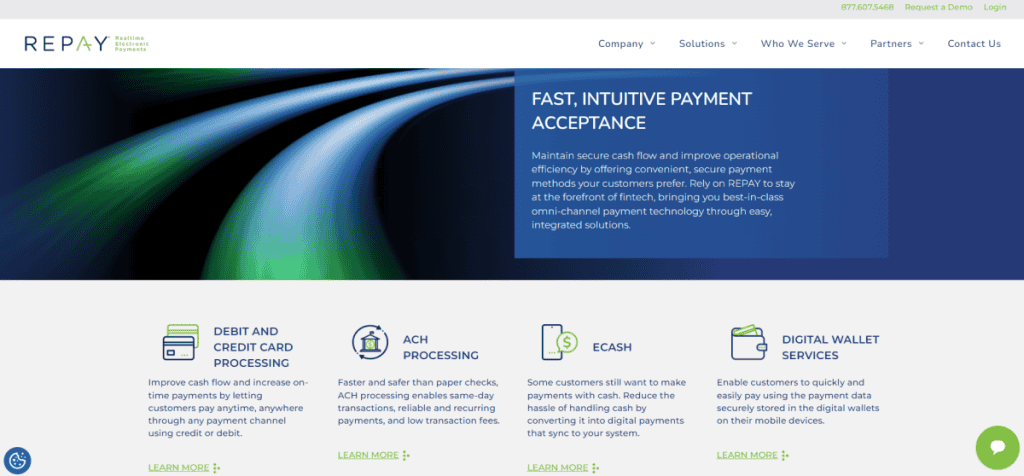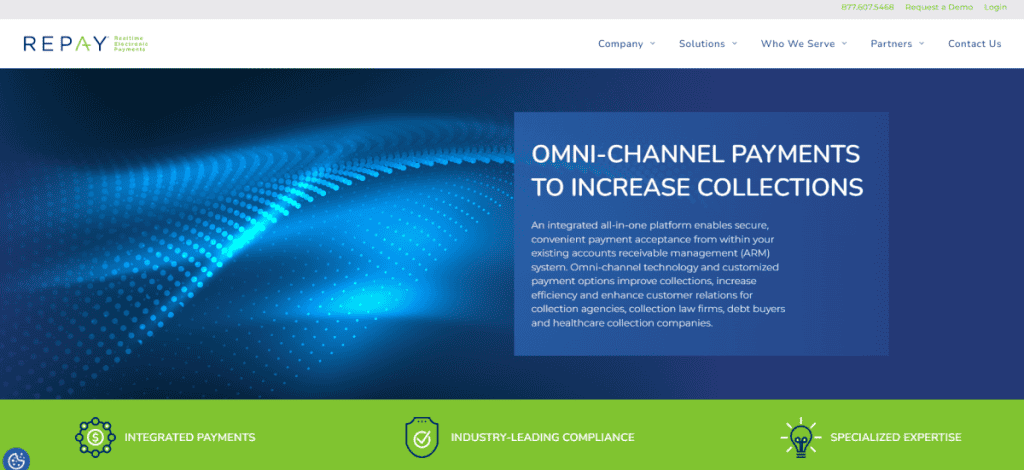
Billingtree Review
- 07th Aug, 2024
- | By Linda Mae
- | Reviews
BillingTree is a reputable company in the payment processing sector, recognized for providing a wide array of payment solutions designed for different industries. This review seeks to offer a comprehensive examination of the company’s history, offerings, and general performance. Lets read more about Billingtree Review.
Established in 2003, BillingTree has developed a trustworthy image as a provider of omni-channel integrated payment solutions. The company has created services to simplify payment procedures, aiding businesses in efficiently overseeing customer payments across various mediums, such as online, mobile, and text payments. BillingTree was founded in 2003 to simplify payment processing for companies in different industries. Throughout the years, the company has broadened its services and experienced substantial growth, emerging as a major player in the payment solutions industry. Innovation and customer service have played a crucial role in driving its success.
BillingTree is headquartered in Scottsdale, Arizona. The leadership team, including CEO Christine “Chris” Lee, has played a crucial role in steering the company towards its current position in the industry. The team’s extensive experience in the payments sector has been instrumental in developing and executing the company’s strategic vision.
In 2021, BillingTree was acquired by Repay Holdings Corporation for approximately $503 million. This acquisition marked a significant milestone in BillingTree’s history, further expanding its footprint in key industries such as healthcare, credit unions, and accounts receivable management. Repay Holdings’ acquisition allowed BillingTree to improve its services and expand its operations more efficiently. This strategic decision is anticipated to generate substantial synergies and broaden the combined company’s presence in the payment processing market.
The acquisition’s goal is to offer clients a stronger range of services by combining BillingTree’s advanced technology and payment solutions with Repay’s comprehensive platform, ensuring businesses can manage payments efficiently and securely.
Products and Services | Billingtree Review
BillingTree provides a comprehensive range of products and services created to simplify payment processing for businesses in different sectors. At the core of their services is the Payrazr platform, a holistic payment solution that accommodates various payment methods and integration choices.
Detailed Description of Payrazr Platform
The Payrazr platform is BillingTree’s flagship product, designed to provide businesses with a seamless and integrated payment processing experience. It consolidates various payment channels into a single, user-friendly interface, allowing businesses to manage all their transactions efficiently. Payrazr is particularly noted for its flexibility and ability to support a wide range of payment methods.
Payment Methods Supported Credit and Debit Card Transactions
Payrazr allows companies to receive payments via popular credit and debit cards. This function is crucial for retail and e-commerce companies, offering a convenient option for customers to buy products.
ACH Transfers
The platform also supports ACH (Automated Clearing House) transfers, allowing businesses to handle direct bank transactions. This method is particularly useful for recurring payments, such as subscriptions and regular invoices, providing a low-cost alternative to card transactions.
SMS Payments
One special aspect is that it offers assistance for SMS payments. Clients have the option to pay by texting, which is then handled via their mobile number. This new method improves customer ease and may boost payment percentages.
Online Payments
BillingTree’s platform supports online payments, making it easy for businesses to integrate payment gateways into their websites. This feature is crucial for e-commerce operations, enabling secure and efficient online transactions.
Mobile/POS Transactions
The Payrazr platform also facilitates transactions through mobile devices and point-of-sale (POS) systems. Businesses have the option to accept payments using mobile devices or traditional POS systems, allowing for versatility in processing transactions both in-store and on-the-go.
Automated Payment Processing Features
It offers automated payment processing features that reduce manual intervention, streamline operations, and minimize errors. These features include automated billing, recurring payments, and batch processing, all designed to enhance efficiency.
Payment Reporting and Analytics
The platform offers in-depth reporting and analytics, granting businesses visibility into their payment processes. These reports aid in monitoring successful and unsuccessful transactions, refunds, and cancellations, leading to improved financial management and decision-making.
Secure Transaction Processing
Security is a top priority for BillingTree. The platform incorporates advanced fraud prevention tools and encryption technologies to ensure that all transactions are processed securely. This commitment to security helps protect both businesses and their customers from potential fraud.
Integration Options
BillingTree provides various integration options to accommodate a range of business requirements. Businesses have the option to either incorporate Payrazr into their current systems through web-based APIs or choose a hosted payment page solution. These choices for integration make sure that companies can personalize their payment processing configuration to match their particular needs.
In summary, BillingTree’s Payrazr platform is a versatile and comprehensive solution that supports a variety of payment methods and features designed to enhance payment processing efficiency and security.
Pricing, Rates, and Fees
BillingTree’s pricing structure is known for its complexity and variability, making it essential for potential clients to understand the various components involved. The company’s pricing models are designed to be flexible, catering to the specific needs of different businesses. However, detailed pricing information is often not disclosed publicly, requiring direct contact for precise quotes.
BillingTree uses a flexible pricing structure that is adaptable depending on the type of business, volume of transactions, and other variables. This method enables personalized pricing but can also result in cost uncertainties.
The variable pricing model used by BillingTree includes different rates for various transaction types:
Swiped Rates: Typically range from 1.00% to 4.99% per transaction. These rates apply to transactions where the card is physically present and swiped.
Keyed-in Rates: Also range from 1.00% to 4.99%, these rates apply to transactions where card details are manually entered, often leading to higher risk and thus higher fees.
Virtual Terminal Rates: Similar to keyed-in rates, these apply to transactions processed through a virtual terminal.
Hidden Fees and Undisclosed Charges: One major issue with BillingTree’s pricing model is the risk of hidden fees and undisclosed charges. Although the company does not offer specific pricing details on its website, businesses could face extra expenses including:
Payment Gateway Fees: Fees for using the payment gateway services.
Batch Fees: Charges applied each time a batch of transactions is settled.
PCI Compliance Fees: Fees related to maintaining Payment Card Industry Data Security Standard (PCI DSS) compliance.
Equipment Lease Terms: Costs associated with leasing point-of-sale (POS) equipment, which can vary based on the type and duration of the lease.
Comparison with Industry Standards: Compared to industry standards, BillingTree’s rates and fees are relatively high, particularly the virtual terminal and keyed-in rates. The lack of transparency in their pricing model can make it challenging for businesses to predict their costs accurately and compare them with other payment processors. This can lead to difficulties in budget planning and financial forecasting for businesses relying heavily on BillingTree’s services.
Ultimately, although BillingTree provides adaptable and tailor-made pricing structures, prospective customers should expect an extensive negotiation procedure to grasp all potential charges and rates thoroughly. It is crucial to communicate directly with BillingTree staff to get a customized pricing plan that suits the specific requirements of your business.
Contract Terms
BillingTree’s contract terms are an important consideration for businesses evaluating their payment processing solutions. Understanding the length and flexibility of contracts, early termination fees, and the negotiability of rates can help businesses make informed decisions.
Length and Flexibility of Contracts: BillingTree typically offers contracts with a standard length of three years. While this duration is common in the payment processing industry, it may not suit all businesses, especially those looking for shorter-term commitments. The flexibility of these contracts can vary, and it is advisable for businesses to discuss their specific needs with BillingTree representatives to determine if customized contract terms are available.
Early Termination Fees: One of the critical aspects of BillingTree’s contract terms is the early termination fee. This cost could be a major factor for companies that might have to end their agreement early. It is important for businesses to ask about the early termination fee amount during negotiations as it is frequently not publicly disclosed. Understanding these fees upfront can prevent unexpected costs if the need to end the contract early arises.
Negotiability of Rates Based on Business Size and Type: BillingTree’s rates are somewhat negotiable and can vary depending on the size and type of the business. Bigger companies or those processing a large number of transactions might have more power to discuss for improved rates. In the same way, the sector in which a company functions can impact the prices provided. For example, companies in industries with lower risks could receive better terms than those in industries with higher risks. It is recommended for businesses to provide detailed information about their operations and transaction volumes to BillingTree to facilitate this negotiation.
Setup Process and Any Associated Fees: The setup process with BillingTree is designed to be straightforward, but it may involve certain fees. While the company does not typically charge an account setup fee, there may be costs associated with integrating their system into a business’s existing infrastructure. These costs can include charges for equipment leasing, particularly for point-of-sale (POS) systems, and any necessary software integrations. Discussing these potential fees with a BillingTree representative during the initial stages can help businesses budget accordingly and avoid unexpected expenses.
Customer Service and Support
BillingTree is dedicated to offering extensive customer service and support to its clientele. The company provides various support choices to guarantee that businesses can get help whenever necessary.
BillingTree offers domestic telephone support, offshore technical support, real-time online support, and a strong knowledge base within their customer service framework. These choices are created to quickly resolve a variety of customer requirements and technical problems.
Domestic Phone Support: BillingTree offers domestic phone support during business hours. This service allows clients to speak directly with customer service representatives who can assist with various inquiries and problems related to payment processing.
Offshore Technical Support: For after-hours support, BillingTree provides offshore technical assistance. This ensures that clients can receive help around the clock, minimizing downtime and maintaining the continuity of their operations.
Live Online Support and Knowledge Base: In addition to phone support, BillingTree features live online support. This includes chat services where clients can get real-time assistance. The company also maintains a comprehensive knowledge base, which provides detailed articles and guides on common issues and questions.
Common Customer Service Complaints: Despite the extensive support options, some customers have reported issues with BillingTree’s customer service. Common complaints include unresponsiveness and unhelpfulness of representatives. There have been instances where clients faced delays in receiving support or found the provided solutions inadequate.
Responsiveness and Helpfulness of Representatives: The responsiveness of BillingTree’s customer service representatives varies. While many clients appreciate the availability of multiple support channels, others have experienced slow response times and a lack of effective solutions.
Ease of Service Cancellation: Another frequent complaint is the difficulty in canceling services. Customers have reported encountering complex procedures and uncooperative representatives when attempting to terminate their contracts, which can lead to frustration and additional costs.
Sales and Marketing Practices
BillingTree employs a range of sales strategies and marketing tactics to attract and retain clients. The company’s approach is designed to promote transparency and build trust, although customer feedback indicates mixed experiences.
Sales Strategies and Marketing Tactics: BillingTree uses a combination of in-house sales teams and sub-Independent Sales Organizations (sub-ISOs) to market its services. This dual approach allows the company to reach a broader audience and offer personalized sales experiences. The in-house team focuses on direct sales and client relationship management, while sub-ISOs help expand market reach through partnerships and indirect sales channels.
Use of In-House Sales Team Versus Sub-ISOs: The in-house sales team at BillingTree is responsible for providing tailored solutions and maintaining close relationships with clients. In contrast, sub-ISOs operate independently, using their networks to sell BillingTree’s services. This strategy helps BillingTree tap into diverse markets but can lead to variations in customer experiences due to differences in sales practices between in-house representatives and sub-ISOs.
Transparency in Advertising and Rate Disclosure: BillingTree aims to maintain transparency in its advertising and rate disclosures. However, the lack of publicly available detailed pricing information can sometimes create challenges for potential clients trying to compare BillingTree’s rates with those of competitors. The company emphasizes the need for direct consultation to provide customized pricing based on individual business needs.
Customer Feedback on Sales Practices: Customer opinions on BillingTree’s sales tactics vary. Some customers value the individualized assistance and thorough help given by the internal staff. Nonetheless, some have raised concerns about deceptive data and aggressive sales methods, especially from sub-ISOs. Some customers still worry about the transparency of rate disclosure, feeling that they were not completely informed about all potential costs from the beginning.
In summary, while BillingTree employs a robust mix of sales and marketing strategies, there is room for improvement in ensuring consistent and transparent customer experiences across all sales channels.
Legal and Regulatory Issues
BillingTree has encountered several legal and regulatory issues that have impacted its reputation. Understanding these issues is crucial for potential clients evaluating the company’s trustworthiness and reliability.
BillingTree has faced legal challenges, including lawsuits and fines, which highlight some of the regulatory issues the company has dealt with over the years. These issues often revolve around compliance and business practices, impacting their standing with clients and regulators.
FTC Lawsuit and Settlement Details: In 2019, BillingTree settled a significant lawsuit with the Federal Trade Commission (FTC) for $1.25 million. The FTC alleged that BillingTree had made false and misleading claims about the effectiveness and ease of use of its payment processing services. This settlement required BillingTree to adjust its marketing practices and ensure greater transparency in its service claims to avoid misleading consumers.
State Attorney General Fines and Reasons: BillingTree has also been fined by state attorneys general for various infractions. For instance, in 2020, the Oregon Department of Justice fined the company $250,000 for deceptive practices and failure to disclose certain fees adequately. These fines underscore the importance of transparent business practices and compliance with state regulations.
Impact of Legal Issues on Reputation and Trustworthiness: The legal issues faced by BillingTree have had a mixed impact on its reputation. On the one hand, settlements and fines have raised concerns about the company’s business practices and compliance. However, the company’s readiness to resolve conflicts and make required changes shows a dedication to dealing with regulatory issues and enhancing its procedures. Nevertheless, prospective customers must take into account these legal and regulatory matters while assessing BillingTree’s reliability and make sure they comprehend the terms and conditions of any contract.
Customer Reviews and Complaints
BillingTree’s customer reviews and complaints provide a mixed picture of its performance. Analyzing feedback from platforms like the Better Business Bureau (BBB), Merchant Alternatives, and CardPaymentOptions reveals both positive and negative aspects of the company’s services.
BillingTree has received an A+ rating on the BBB, suggesting overall good feedback. Nevertheless, the limited amount of reviews might not offer a comprehensive perspective. Both Merchant Alternatives and CardPaymentOptions provide in-depth analysis, discussing the pros and cons as shared by users.
Common Themes in Customer Feedback Positive Aspects: Customers appreciate BillingTree’s robust feature set and reliability. The Payrazr platform is often praised for its comprehensive payment processing capabilities, including multiple payment methods and strong security features. Users find the platform efficient and effective in handling transactions, contributing to operational ease and enhanced customer satisfaction.
Negative Aspects: Despite the positive feedback, several recurring complaints are noted across different review platforms. A common issue is unclear pricing, with customers expressing frustration over hidden fees and lack of upfront disclosure. Poor customer service is another significant concern, with reports of unresponsive and unhelpful support representatives. Additionally, some customers have encountered unauthorized billing, further aggravating their dissatisfaction. These negative aspects highlight areas where BillingTree could improve its transparency and customer support.
In conclusion, while BillingTree is valued for its reliable and feature-rich payment processing solutions, issues such as unclear pricing, poor customer service, and unauthorized billing need to be addressed to enhance overall customer satisfaction. Potential clients should consider these factors and conduct thorough research before committing to BillingTree’s services.
Comparison with Competitors
BillingTree operates in a competitive payment processing industry with several notable competitors. Understanding how BillingTree stacks up against these competitors helps highlight its strengths and areas for improvement.
Key Competitors in the Payment Processing Industry: Key competitors of BillingTree include Square, PayPal, Stripe, and Authorize.Net. These companies are well-known for their comprehensive payment solutions and extensive market reach.
Strengths and Weaknesses Relative to Competitors Strengths: BillingTree’s main strength lies in its versatile Payrazr platform, which supports a wide range of payment methods including SMS payments—a relatively unique feature. Additionally, BillingTree’s focus on industries like healthcare and credit unions allows it to offer specialized solutions that some competitors may not provide.
Weaknesses: However, BillingTree falls short in pricing transparency and customer service. Competitors like Square and PayPal are often praised for their clear, upfront pricing models and user-friendly services. Additionally, BillingTree’s customer support has received mixed reviews, with some users reporting unresponsive service, whereas companies like Stripe are known for their robust support systems.
Unique Selling Points of BillingTree: BillingTree’s unique selling points include its specialized payment solutions for specific industries such as healthcare and its innovative SMS payment option. The Payrazr platform’s comprehensive capabilities, including ACH transfers and integrated payment reporting, also stand out. These features cater to businesses needing more customized and versatile payment processing options.
In summary, while BillingTree has some distinct advantages in specialized services and payment options, it faces stiff competition from more transparent and user-friendly providers. Potential clients should weigh these factors carefully when choosing a payment processing solution.
Pros and Cons
There are various pros and cons of using BillingTree that potential clients may want to weigh.
Pros
Wide Range of Payment Options: BillingTree offers a range of payment options such as credit and debit cards, ACH transfers, SMS payments, online payments, and mobile/POS transactions. This flexibility enables companies to meet a variety of customer tastes.
Comprehensive Reporting and Analytics: The Payrazr platform provides detailed payment reporting and analytics, helping businesses monitor transactions, identify trends, and make informed decisions.
Strong Security Features: BillingTree focuses on secure transaction processing by integrating advanced fraud prevention tools and encryption technologies to safeguard sensitive data.
Flexible Integration Options: Businesses can integrate BillingTree’s services into their existing systems using web-based APIs or hosted payment pages, offering a tailored payment processing solution.
Generally Positive Customer Feedback: Many users appreciate BillingTree’s robust feature set and reliable performance, highlighting the platform’s efficiency and effectiveness.
Cons
Unclear and Undisclosed Pricing Details: One of the most significant drawbacks is the lack of transparency in pricing. Hidden fees and undisclosed charges can make it difficult for businesses to predict costs accurately.
Reports of Poor Customer Service: Customer feedback frequently highlights that support representatives are unresponsive and unhelpful, leading to delays and insufficient assistance for some users.
Difficulties in Canceling Services: Clients have reported encountering challenges when attempting to cancel their services, including complex procedures and uncooperative representatives.
Instances of Unauthorized Billing: Some clients have encountered problems with unauthorized charges, making their interactions with BillingTree more difficult..
Legal and Regulatory Issues Affecting Reputation: The company’s history of lawsuits and fines, including a significant settlement with the FTC, has raised concerns about its business practices and compliance.
To sum up, even though BillingTree provides a thorough and secure payment processing solution with adaptable choices and mostly favorable reviews, prospective customers should take note of the difficulties concerning pricing clarity, customer support, and regulatory concerns.
Conclusion
BillingTree provides a comprehensive payment processing platform with a variety of features and high security measures. Yet, the lack of transparency in pricing and problems with customer service are notable disadvantages. Before selecting BillingTree as their payment processing provider, potential customers should carefully evaluate the advantages and disadvantages and assess their individual requirements.



